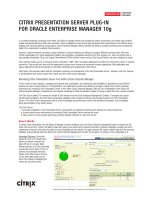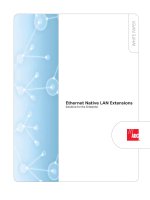Tài liệu Ethernet Native LAN Extensions Solutions for the Enterprise docx
Bạn đang xem bản rút gọn của tài liệu. Xem và tải ngay bản đầy đủ của tài liệu tại đây (1.95 MB, 8 trang )
WHITE PAPER
Ethernet Native LAN Extensions
Solutions for the Enterprise
Ethernet Native
LAN Extensions
Solutions for the Enterprise
Overview
In today’s fast paced economic climate, enterprise companies are continually
pressured to do more with less, yet they are expanding their reach nationally
and globally at a record pace. The corporate network is being stretched like
never before. New applications such as video conferencing and monitoring,
file sharing, and Voice over IP (VoIP) demand more bandwidth. Regulatory
requirements are putting pressure on IT resources for compliance, and remote
locations need to receive the same application support and resources as the
corporate network – all without increasing cost. The network has become
a critical tool and most corporate IT departments are looking to Ethernet as
a solution to help meet the growing list of demands. Ethernet Native LAN
extensions allow corporations to remove capital and operational costs from
their existing network infrastructure. New technologies that deliver higher
bandwidth at a lower cost per megabit are now available and becoming widely
deployed. This paper will discuss how Enterprise companies can use Ethernet
Native LAN extension platforms to cost effectively deliver multiple applications
and more bandwidth to all locations, regardless of where they are located.
Ethernet Native LAN Extensions - Solutions for the Enterprise
Page 3
Native LAN Extension
Native LAN Extension gives enterprise companies the ability to connect their LANs together in such a way that the
network is transparent to physical boundaries. All of the LANs appear as if they were connected on the same network
regardless of location. Additionally, Native LAN Extension allows enterprise IT managers to leverage the speed and
simplicity of Ethernet to save both capital costs and operational costs in the network. With Native LAN Extensions,
enterprise companies do not have to learn or manage complex technologies such as SONET/SDH, frame relay or ATM.
They only work with Ethernet, a familiar LAN technology, and leverage a provider’s expertise and resources in wide
area technologies.
Native LAN Extension can be deployed in three types of configurations:
• Point-to-Point
• Point-to-Multipoint
• Multipoint-to-Multipoint
Point-to-Point
The Metro Ethernet Forum (MEF) defines a point-to-point connection as an E-Line Ethernet service type that is based
on a point-to-point Ethernet Virtual Connection (EVC). An E-Line service delivers Ethernet-based LAN services across a
local or metro serving area from one point to another.
Point-to-Multipoint
A point-to-multipoint connection delivers Ethernet-based services across a national or international serving area in a
hub-and-spoke topology. In this topology, a router or switch at the main enterprise hub node would have to supply
the connectivity between the nodes on the end of the spokes.
Multipoint-to-Multipoint
A multipoint-to-multipoint topology uses VLAN tags to deliver differentiated Ethernet services from a single or multiple
customers over a Native LAN. The MEF defines this topology as an E-LAN service, and it is also known as a star
topology. A star network supplies multipoint-to-multipoint connectivity between all customer nodes.
Ethernet Native LAN Extensions - Solutions for the Enterprise
Page 4
Ethernet over T1/E1
T1/E1 lines and frame relay connections are still the primary mode of transport for enterprise companies of all sizes to
reach many of their office locations. But despite its ubiquity in the last mile, frame relay cannot offer the bandwidth,
flexibility, or scalability that Ethernet can. Products are available today that can help enterprise companies leverage
their existing T1/E1 infrastructure to deliver business class Ethernet-based services over these lines in place of frame
relay. Up to 8 T1s can be bonded using the standard Multilink Point-to-Point Protocol (MLPPP) offering up to 12Mb/s
(T1) or 16 Mb/s (E1) of service.
Customer benefi ts include:
• Bonded T1/E1 links provide bandwidth ranging from 1.5 Mb/s to 16 Mb/s and automatic removal/restoration of
failed links.
• Use of existing T1/E1 lines to deliver Ethernet services to all locations.
• Plug and play platform and design.
• Easy access to configure or disable access and ports from anywhere via secure in-band management access from
anywhere on the network.
Core
Bonded T1/E1s
T1/E1
Ethernet
VoIP PBX
Switch/Router
Switch/Router
Example of Ethernet over T1/E1
Ethernet Native LAN Extensions - Solutions for the Enterprise
Page 5
Ethernet over DS3
Most enterprise WAN networks today use DS1 or DS3 connections. Most services in place today that use DS3 circuits
require an all or none approach – either the entire 45 megabits is used or none is. By adding Ethernet services to a
DS3, bandwidth can now be groomed to any increment from sub 10megabits up to 45 megabits, allowing a “pay as
you grow” approach to service.
Customer benefi ts include:
• Use of existing DS3 connections to deliver Ethernet services to all locations.
• Plug and play platform and design.
• Enhanced user traffic classification for better management.
• Easy access to configure or disable access and ports from anywhere via secure in-band management access from
anywhere on the network.
• Delivery of circuit based TDM services via circuit emulation in addition to Ethernet from the same platform.
Switch/
Router
Switch/
Router
Switch/
Router
Ethernet
Ethernet
Ethernet
VoIP PBX
Traditional PBX
Ethernet
T1
GigE
Regional Office or HQ
Remote Sites
T1s
PBX
PSTN
IP/MPLS
DS3
DS3
DS3
Transport
Network
Site 1
Site 2
Site 3
Example of Ethernet over DS3
Ethernet Native LAN Extensions - Solutions for the Enterprise
Page 6
Ethernet over SONET/SDH
Enterprise companies have always wanted to extend the benefits of Ethernet beyond the borders of their Local Area
Networks (LANS) to go over Metropolitan Area Networks (MANs) and Wide Area Networks (WANs) to connect remote
offices. SONET/SDH has been a mainstay in carrier networks for years because of its reliability, consistency of service,
and fault recovery strengths. As enterprises continue to push Ethernet across multiple locations in a city or region, the
industry has responded by developing new ways of transporting Ethernet across different topologies. Transporting
Ethernet over SONET/SDH gives enterprise companies a “best of both worlds” solution. Converged packet access
solutions give enterprise companies a way to bridge the TDM and packet worlds to deliver flexible, business class
Ethernet services over existing SONET/SDH networks. Ethernet over SONET/SDH can also be deployed on private
campus network facilities as well.
Customer benefi ts include:
• Leveraging existing SONET/SDH networks to deliver new Ethernet services, while lowering the costs to provide
these services.
• Delivery of circuit based TDM services via circuit emulation in addition to Ethernet from the same platform.
• Meet current user requirements for Ethernet services, while positioning the network for future evolution to an IP/
MPLS core.
Remote Office
Large Office
Ethernet
Remote Fiber
Attached Office
Ethernet
Ethernet
Metro
SONET/SDH
Network
HQ
LEC
ADM
ADM
PSTN
IP/MPLS
Core
PBX
ADM
OC3/12
OC3/12
Example of Ethernet over SONET/SDH
Ethernet Native LAN Extensions - Solutions for the Enterprise
Page 7
MultiService Ethernet
Many enterprise networks today require a separate physical circuit for each voice and data network offering. This
scenario allows for the enterprise company to provide access to most of its locations. Traffic can be kept totally
separate or can be bridged across all locations to form a single LAN. Additionally, the headquarters location can
aggregate multiple discrete circuits or larger channelized links (such as channelized DS3), if need be. Converged packet
access solutions give enterprise companies a way to deliver multiservice Ethernet to all locations, regardless of where
they are located, all over the same platform.
Customer benefi ts include:
• Leveraging the combined benefits of both LAN Extension and T1 circuit emulation applications.
• Adding new corporate locations economically using a leased access circuit.
• Minimizing network costs by delivering the appropriate amount of bandwidth at each location.
• Lowering toll charges by transporting traditional voice services and data over the same network.
T1/E1
T1/E1
Ethernet
T1/E1
T1/E1
Ethernet
ch. DS3
(MLPPP)
DS3
OC-3/STM-1
OC-12/STM-4
NxT1/E1
DS3/NxDS3
OC-3/STM-1
OC-12/STM-4
Service
provider or
private network
Ethernet
Ethernet
Example of MultiService Ethernet
Resilient Ethernet
Instead of having voice, video and data delivered over separate parallel networks, many enterprise
customers seek to deliver multiple services over a single Ethernet based network. In order for voice
calls to be delivered seamlessly over a packet-based network, there must be a sub-50 millisecond
resiliency in place to ensure voice calls can be carried seamlessly across the network. Layer 2/3
switches generally take much longer to switchover in the event of a failure but protected switching
ring solutions now exist and can be deployed that give enterprise companies a solution for sub-50
millisecond resiliency.
Storage Network & WAN Back-up
The explosion of data generated and used by businesses has made storage a critical priority for
enterprises of all sizes. In addition, numerous pieces of legislation have required the remote archiving
and protection of data. This huge increase in storage and storage extension has made network
uptime a critical function. Ethernet Native LAN extensions can facilitate the implementation of a cost
effective resilient network designed to support the transport of large amounts of information.
Summary
Ethernet Native LAN Extension solutions provide cost effective, ubiquitous solutions to enterprise
companies for their converged packet applications for voice, video and data. Flexible bandwidth and
existing facilities ranging including Nx T1/E1, DS3, OC3/STM1, OC12/STM3 and GigE can be used
to provide an integrated, cost effective solution optimized for each location within the enterprise
company. These Native LAN Extensions can also be provided over Carrier provided leased facilities or
private enterprise networks.
Web Site: www.adc.com
From North America, Call Toll Free: 1-800-366-3891 • Outside of North America: +1-952-938-8080
Fax: +1-952-917-3237 • For a listing of ADC’s global sales office locations, please refer to our web site.
ADC Telecommunications, Inc., P.O. Box 1101, Minneapolis, Minnesota USA 55440-1101
Specifications published here are current as of the date of publication of this document. Because we are continuously
improving our products, ADC reserves the right to change specifications without prior notice. At any time, you may
verify product specifications by contacting our headquarters office in Minneapolis. ADC Telecommunications, Inc.
views its patent portfolio as an important corporate asset and vigorously enforces its patents. Products orfeatures
contained herein may be covered by one or more U.S. or foreign patents. An Equal Opportunity Employer
103517AE 9/06 Original © 2006 ADC Telecommunications, Inc. All Rights Reserved
WHITE PAPER
GigE with
sub - 50 msec
PSR
10/100/100
T1/E1, NxT1/E1, DS3,
OC-3/STM-1, OC-12/STM-4
Example of Resilient Ethernet









